Ethics and Professional Practice Case Study: Analysis and Discussion
VerifiedAdded on 2022/10/04
|6
|1504
|131
Case Study
AI Summary
This case study examines a scenario involving a community service worker, Rodriguez, and a client, Cathalina, who is struggling with drug addiction. The case highlights ethical breaches, including a lack of communication and professional responsibility by a colleague, James, who fails to inform Rodriguez when Cathalina relapses. The analysis explores violations of fidelity, beneficence, and justice principles, as well as the absence of professional development. Stakeholders such as the family service agency, Cathalina, and James are identified, and their roles and potential outcomes are discussed. The study underscores the importance of informed consent, patient confidentiality, and the ethical responsibilities of professionals in handling sensitive cases. The potential consequences of the ethical failures, including legal actions, loss of patient trust, and professional repercussions, are also examined.
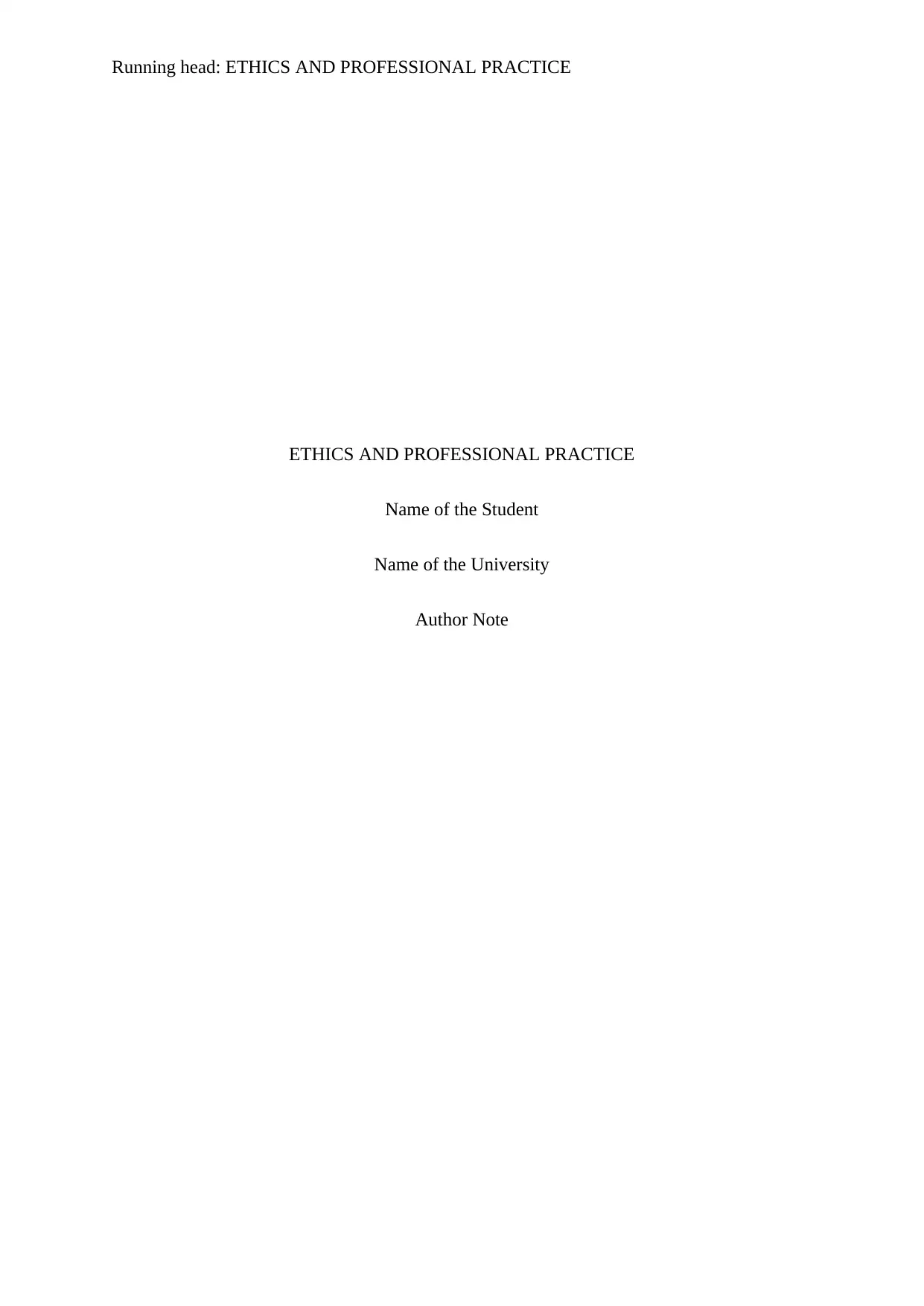
Running head: ETHICS AND PROFESSIONAL PRACTICE
ETHICS AND PROFESSIONAL PRACTICE
Name of the Student
Name of the University
Author Note
ETHICS AND PROFESSIONAL PRACTICE
Name of the Student
Name of the University
Author Note
Paraphrase This Document
Need a fresh take? Get an instant paraphrase of this document with our AI Paraphraser
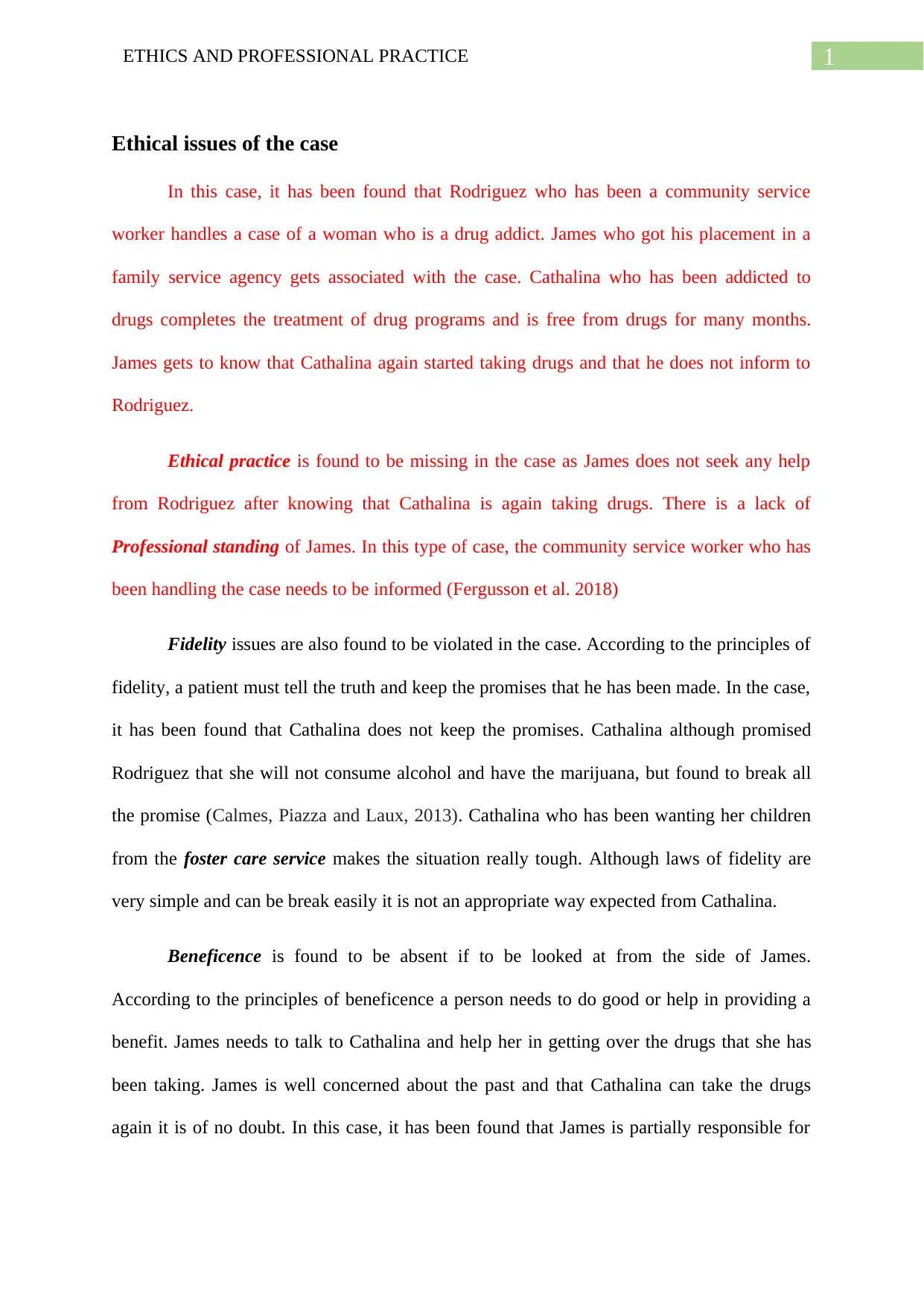
1ETHICS AND PROFESSIONAL PRACTICE
Ethical issues of the case
In this case, it has been found that Rodriguez who has been a community service
worker handles a case of a woman who is a drug addict. James who got his placement in a
family service agency gets associated with the case. Cathalina who has been addicted to
drugs completes the treatment of drug programs and is free from drugs for many months.
James gets to know that Cathalina again started taking drugs and that he does not inform to
Rodriguez.
Ethical practice is found to be missing in the case as James does not seek any help
from Rodriguez after knowing that Cathalina is again taking drugs. There is a lack of
Professional standing of James. In this type of case, the community service worker who has
been handling the case needs to be informed (Fergusson et al. 2018)
Fidelity issues are also found to be violated in the case. According to the principles of
fidelity, a patient must tell the truth and keep the promises that he has been made. In the case,
it has been found that Cathalina does not keep the promises. Cathalina although promised
Rodriguez that she will not consume alcohol and have the marijuana, but found to break all
the promise (Calmes, Piazza and Laux, 2013). Cathalina who has been wanting her children
from the foster care service makes the situation really tough. Although laws of fidelity are
very simple and can be break easily it is not an appropriate way expected from Cathalina.
Beneficence is found to be absent if to be looked at from the side of James.
According to the principles of beneficence a person needs to do good or help in providing a
benefit. James needs to talk to Cathalina and help her in getting over the drugs that she has
been taking. James is well concerned about the past and that Cathalina can take the drugs
again it is of no doubt. In this case, it has been found that James is partially responsible for
Ethical issues of the case
In this case, it has been found that Rodriguez who has been a community service
worker handles a case of a woman who is a drug addict. James who got his placement in a
family service agency gets associated with the case. Cathalina who has been addicted to
drugs completes the treatment of drug programs and is free from drugs for many months.
James gets to know that Cathalina again started taking drugs and that he does not inform to
Rodriguez.
Ethical practice is found to be missing in the case as James does not seek any help
from Rodriguez after knowing that Cathalina is again taking drugs. There is a lack of
Professional standing of James. In this type of case, the community service worker who has
been handling the case needs to be informed (Fergusson et al. 2018)
Fidelity issues are also found to be violated in the case. According to the principles of
fidelity, a patient must tell the truth and keep the promises that he has been made. In the case,
it has been found that Cathalina does not keep the promises. Cathalina although promised
Rodriguez that she will not consume alcohol and have the marijuana, but found to break all
the promise (Calmes, Piazza and Laux, 2013). Cathalina who has been wanting her children
from the foster care service makes the situation really tough. Although laws of fidelity are
very simple and can be break easily it is not an appropriate way expected from Cathalina.
Beneficence is found to be absent if to be looked at from the side of James.
According to the principles of beneficence a person needs to do good or help in providing a
benefit. James needs to talk to Cathalina and help her in getting over the drugs that she has
been taking. James is well concerned about the past and that Cathalina can take the drugs
again it is of no doubt. In this case, it has been found that James is partially responsible for
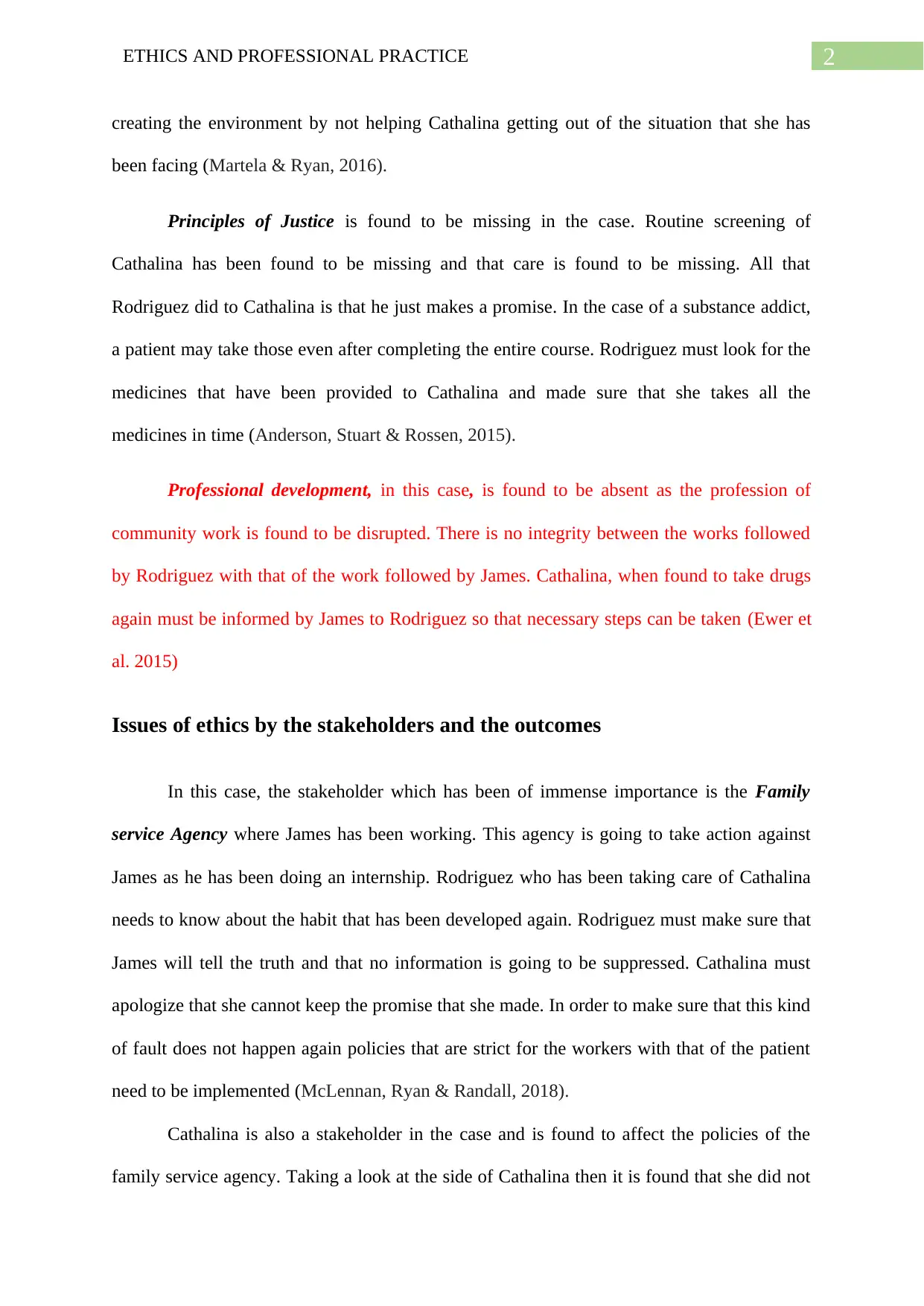
2ETHICS AND PROFESSIONAL PRACTICE
creating the environment by not helping Cathalina getting out of the situation that she has
been facing (Martela & Ryan, 2016).
Principles of Justice is found to be missing in the case. Routine screening of
Cathalina has been found to be missing and that care is found to be missing. All that
Rodriguez did to Cathalina is that he just makes a promise. In the case of a substance addict,
a patient may take those even after completing the entire course. Rodriguez must look for the
medicines that have been provided to Cathalina and made sure that she takes all the
medicines in time (Anderson, Stuart & Rossen, 2015).
Professional development, in this case, is found to be absent as the profession of
community work is found to be disrupted. There is no integrity between the works followed
by Rodriguez with that of the work followed by James. Cathalina, when found to take drugs
again must be informed by James to Rodriguez so that necessary steps can be taken (Ewer et
al. 2015)
Issues of ethics by the stakeholders and the outcomes
In this case, the stakeholder which has been of immense importance is the Family
service Agency where James has been working. This agency is going to take action against
James as he has been doing an internship. Rodriguez who has been taking care of Cathalina
needs to know about the habit that has been developed again. Rodriguez must make sure that
James will tell the truth and that no information is going to be suppressed. Cathalina must
apologize that she cannot keep the promise that she made. In order to make sure that this kind
of fault does not happen again policies that are strict for the workers with that of the patient
need to be implemented (McLennan, Ryan & Randall, 2018).
Cathalina is also a stakeholder in the case and is found to affect the policies of the
family service agency. Taking a look at the side of Cathalina then it is found that she did not
creating the environment by not helping Cathalina getting out of the situation that she has
been facing (Martela & Ryan, 2016).
Principles of Justice is found to be missing in the case. Routine screening of
Cathalina has been found to be missing and that care is found to be missing. All that
Rodriguez did to Cathalina is that he just makes a promise. In the case of a substance addict,
a patient may take those even after completing the entire course. Rodriguez must look for the
medicines that have been provided to Cathalina and made sure that she takes all the
medicines in time (Anderson, Stuart & Rossen, 2015).
Professional development, in this case, is found to be absent as the profession of
community work is found to be disrupted. There is no integrity between the works followed
by Rodriguez with that of the work followed by James. Cathalina, when found to take drugs
again must be informed by James to Rodriguez so that necessary steps can be taken (Ewer et
al. 2015)
Issues of ethics by the stakeholders and the outcomes
In this case, the stakeholder which has been of immense importance is the Family
service Agency where James has been working. This agency is going to take action against
James as he has been doing an internship. Rodriguez who has been taking care of Cathalina
needs to know about the habit that has been developed again. Rodriguez must make sure that
James will tell the truth and that no information is going to be suppressed. Cathalina must
apologize that she cannot keep the promise that she made. In order to make sure that this kind
of fault does not happen again policies that are strict for the workers with that of the patient
need to be implemented (McLennan, Ryan & Randall, 2018).
Cathalina is also a stakeholder in the case and is found to affect the policies of the
family service agency. Taking a look at the side of Cathalina then it is found that she did not
⊘ This is a preview!⊘
Do you want full access?
Subscribe today to unlock all pages.

Trusted by 1+ million students worldwide
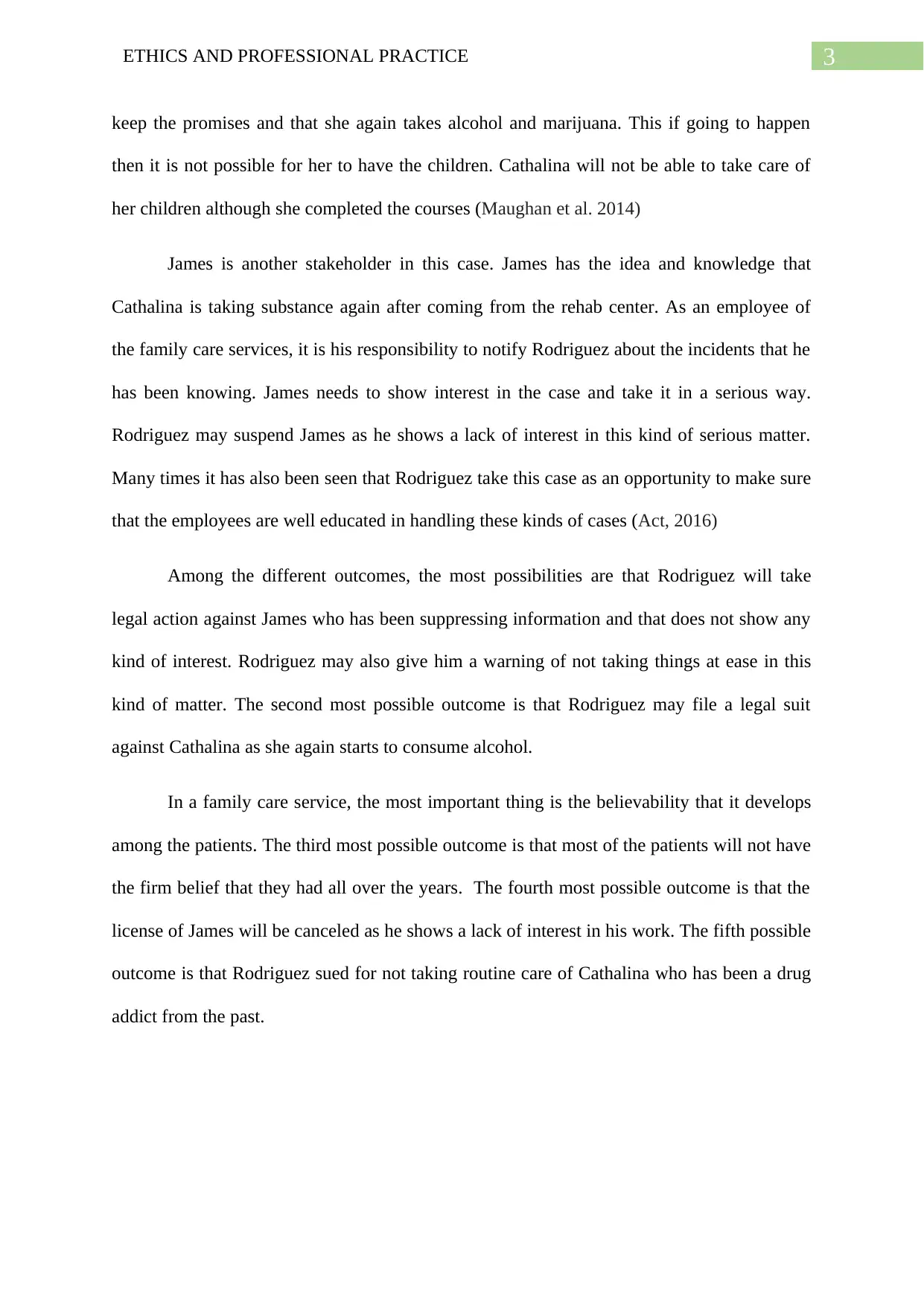
3ETHICS AND PROFESSIONAL PRACTICE
keep the promises and that she again takes alcohol and marijuana. This if going to happen
then it is not possible for her to have the children. Cathalina will not be able to take care of
her children although she completed the courses (Maughan et al. 2014)
James is another stakeholder in this case. James has the idea and knowledge that
Cathalina is taking substance again after coming from the rehab center. As an employee of
the family care services, it is his responsibility to notify Rodriguez about the incidents that he
has been knowing. James needs to show interest in the case and take it in a serious way.
Rodriguez may suspend James as he shows a lack of interest in this kind of serious matter.
Many times it has also been seen that Rodriguez take this case as an opportunity to make sure
that the employees are well educated in handling these kinds of cases (Act, 2016)
Among the different outcomes, the most possibilities are that Rodriguez will take
legal action against James who has been suppressing information and that does not show any
kind of interest. Rodriguez may also give him a warning of not taking things at ease in this
kind of matter. The second most possible outcome is that Rodriguez may file a legal suit
against Cathalina as she again starts to consume alcohol.
In a family care service, the most important thing is the believability that it develops
among the patients. The third most possible outcome is that most of the patients will not have
the firm belief that they had all over the years. The fourth most possible outcome is that the
license of James will be canceled as he shows a lack of interest in his work. The fifth possible
outcome is that Rodriguez sued for not taking routine care of Cathalina who has been a drug
addict from the past.
keep the promises and that she again takes alcohol and marijuana. This if going to happen
then it is not possible for her to have the children. Cathalina will not be able to take care of
her children although she completed the courses (Maughan et al. 2014)
James is another stakeholder in this case. James has the idea and knowledge that
Cathalina is taking substance again after coming from the rehab center. As an employee of
the family care services, it is his responsibility to notify Rodriguez about the incidents that he
has been knowing. James needs to show interest in the case and take it in a serious way.
Rodriguez may suspend James as he shows a lack of interest in this kind of serious matter.
Many times it has also been seen that Rodriguez take this case as an opportunity to make sure
that the employees are well educated in handling these kinds of cases (Act, 2016)
Among the different outcomes, the most possibilities are that Rodriguez will take
legal action against James who has been suppressing information and that does not show any
kind of interest. Rodriguez may also give him a warning of not taking things at ease in this
kind of matter. The second most possible outcome is that Rodriguez may file a legal suit
against Cathalina as she again starts to consume alcohol.
In a family care service, the most important thing is the believability that it develops
among the patients. The third most possible outcome is that most of the patients will not have
the firm belief that they had all over the years. The fourth most possible outcome is that the
license of James will be canceled as he shows a lack of interest in his work. The fifth possible
outcome is that Rodriguez sued for not taking routine care of Cathalina who has been a drug
addict from the past.
Paraphrase This Document
Need a fresh take? Get an instant paraphrase of this document with our AI Paraphraser
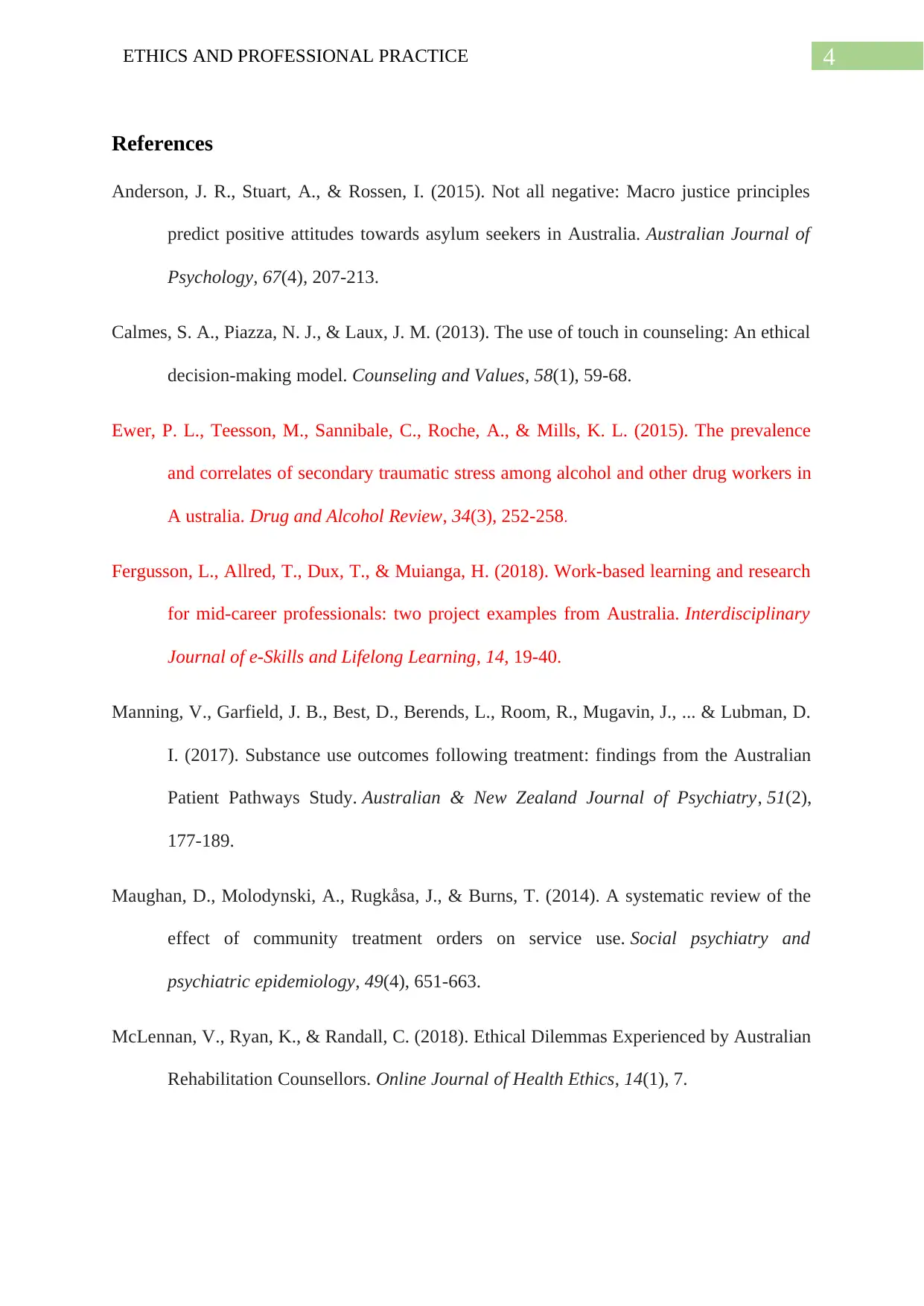
4ETHICS AND PROFESSIONAL PRACTICE
References
Anderson, J. R., Stuart, A., & Rossen, I. (2015). Not all negative: Macro justice principles
predict positive attitudes towards asylum seekers in Australia. Australian Journal of
Psychology, 67(4), 207-213.
Calmes, S. A., Piazza, N. J., & Laux, J. M. (2013). The use of touch in counseling: An ethical
decision‐making model. Counseling and Values, 58(1), 59-68.
Ewer, P. L., Teesson, M., Sannibale, C., Roche, A., & Mills, K. L. (2015). The prevalence
and correlates of secondary traumatic stress among alcohol and other drug workers in
A ustralia. Drug and Alcohol Review, 34(3), 252-258.
Fergusson, L., Allred, T., Dux, T., & Muianga, H. (2018). Work-based learning and research
for mid-career professionals: two project examples from Australia. Interdisciplinary
Journal of e-Skills and Lifelong Learning, 14, 19-40.
Manning, V., Garfield, J. B., Best, D., Berends, L., Room, R., Mugavin, J., ... & Lubman, D.
I. (2017). Substance use outcomes following treatment: findings from the Australian
Patient Pathways Study. Australian & New Zealand Journal of Psychiatry, 51(2),
177-189.
Maughan, D., Molodynski, A., Rugkåsa, J., & Burns, T. (2014). A systematic review of the
effect of community treatment orders on service use. Social psychiatry and
psychiatric epidemiology, 49(4), 651-663.
McLennan, V., Ryan, K., & Randall, C. (2018). Ethical Dilemmas Experienced by Australian
Rehabilitation Counsellors. Online Journal of Health Ethics, 14(1), 7.
References
Anderson, J. R., Stuart, A., & Rossen, I. (2015). Not all negative: Macro justice principles
predict positive attitudes towards asylum seekers in Australia. Australian Journal of
Psychology, 67(4), 207-213.
Calmes, S. A., Piazza, N. J., & Laux, J. M. (2013). The use of touch in counseling: An ethical
decision‐making model. Counseling and Values, 58(1), 59-68.
Ewer, P. L., Teesson, M., Sannibale, C., Roche, A., & Mills, K. L. (2015). The prevalence
and correlates of secondary traumatic stress among alcohol and other drug workers in
A ustralia. Drug and Alcohol Review, 34(3), 252-258.
Fergusson, L., Allred, T., Dux, T., & Muianga, H. (2018). Work-based learning and research
for mid-career professionals: two project examples from Australia. Interdisciplinary
Journal of e-Skills and Lifelong Learning, 14, 19-40.
Manning, V., Garfield, J. B., Best, D., Berends, L., Room, R., Mugavin, J., ... & Lubman, D.
I. (2017). Substance use outcomes following treatment: findings from the Australian
Patient Pathways Study. Australian & New Zealand Journal of Psychiatry, 51(2),
177-189.
Maughan, D., Molodynski, A., Rugkåsa, J., & Burns, T. (2014). A systematic review of the
effect of community treatment orders on service use. Social psychiatry and
psychiatric epidemiology, 49(4), 651-663.
McLennan, V., Ryan, K., & Randall, C. (2018). Ethical Dilemmas Experienced by Australian
Rehabilitation Counsellors. Online Journal of Health Ethics, 14(1), 7.
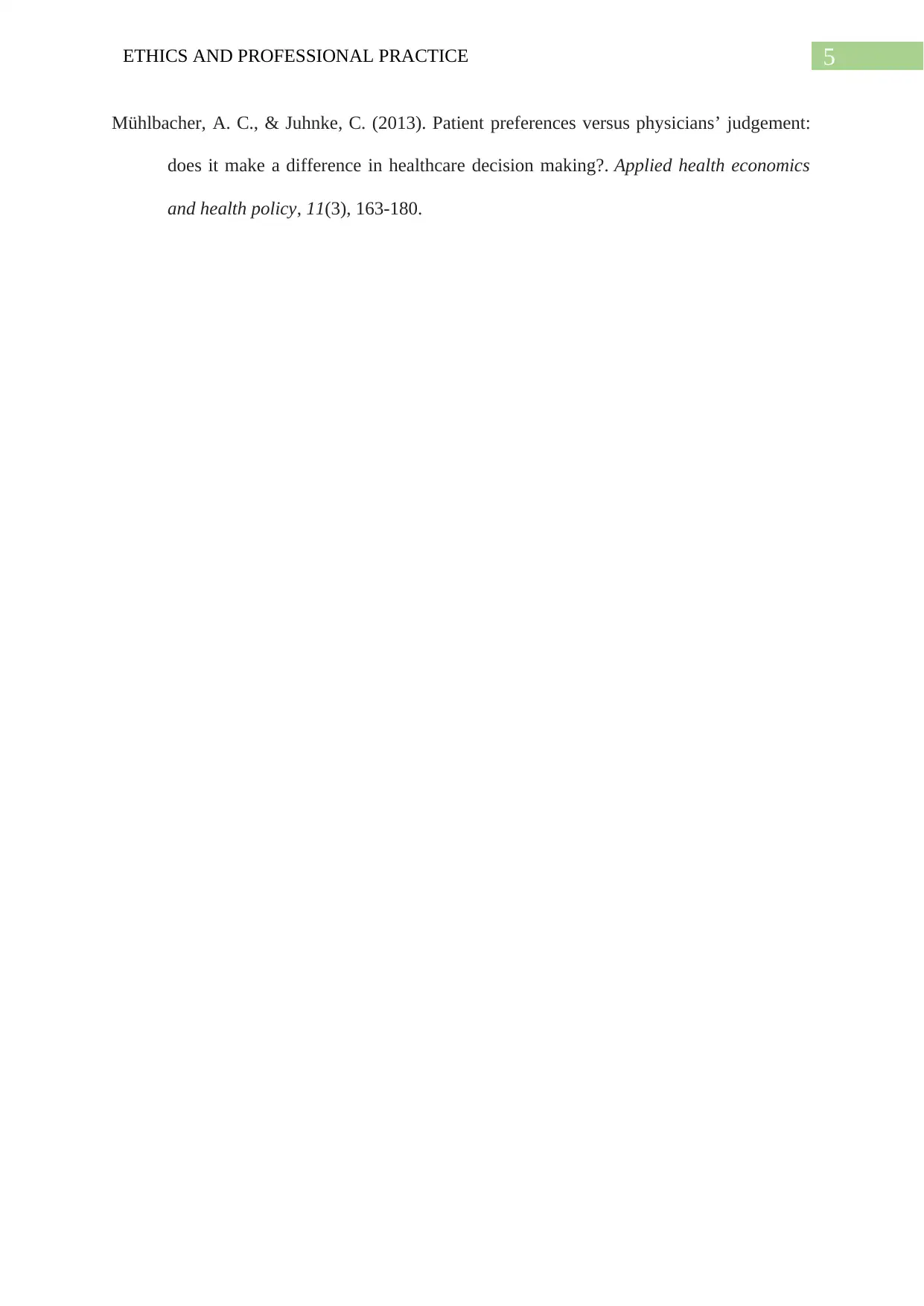
5ETHICS AND PROFESSIONAL PRACTICE
Mühlbacher, A. C., & Juhnke, C. (2013). Patient preferences versus physicians’ judgement:
does it make a difference in healthcare decision making?. Applied health economics
and health policy, 11(3), 163-180.
Mühlbacher, A. C., & Juhnke, C. (2013). Patient preferences versus physicians’ judgement:
does it make a difference in healthcare decision making?. Applied health economics
and health policy, 11(3), 163-180.
⊘ This is a preview!⊘
Do you want full access?
Subscribe today to unlock all pages.

Trusted by 1+ million students worldwide
1 out of 6
Related Documents
Your All-in-One AI-Powered Toolkit for Academic Success.
+13062052269
info@desklib.com
Available 24*7 on WhatsApp / Email
![[object Object]](/_next/static/media/star-bottom.7253800d.svg)
Unlock your academic potential
Copyright © 2020–2025 A2Z Services. All Rights Reserved. Developed and managed by ZUCOL.





